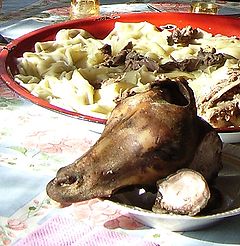Beshbarmak
This article includes a list of references, related reading, or external links, but its sources remain unclear because it lacks inline citations. (February 2013) |

Beşbarmaq, or Beshbarmak (Template:Lang-ky, Template:Lang-kz, Template:Lang-ba, Template:Lang-tt — five finger), is the national dish among nomadic Turkic peoples in Central Asia.
The term Beshbarmak means "five fingers", because the dish is eaten with one's hands. The boiled meat is usually diced with knives, often mixed with boiled noodles, and spiced with onion sauce. It is usually served in a big round dish. Beshbarmak is usually served with shorpo – mutton broth in bowls called kese.
Serving ritual

Beshbarmak is traditionally served according to ritual. Sheep's head boiled in a kazan is put before the most honored guest, usually the eldest one. This person cuts the bits and parts from the head and offers them to the other guests at the table. The younger adults often receive the bones of the legs and shoulders. Boys are given the sheep's ear with wishes to be careful; girls get the palate so as to be diligent. The other parts of the carcass are equally meaningful. The most respected guests are treated to gammon and shank. A young bride receives the brisket; however, married women are given the neck bones. Children are given the kidneys and heart, which are supposed to help them mature but not sheep's brain, because it is believed to make them weak-willed. Knuckle is never served to a young girl, because of the belief that it will cause her to remain an old maid.
See also
References
External links
